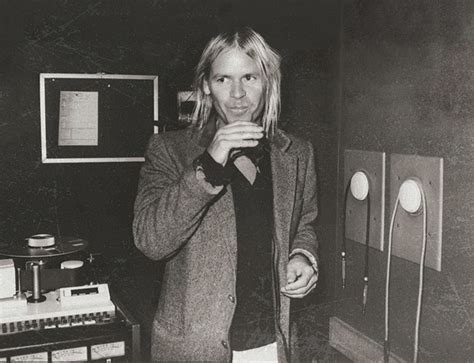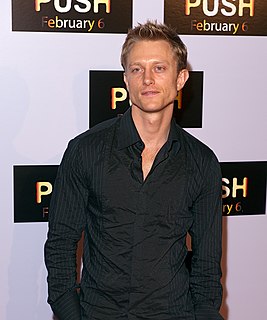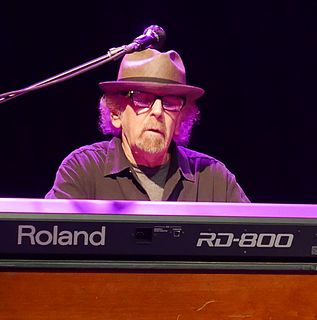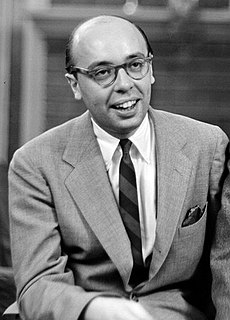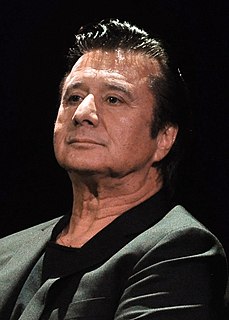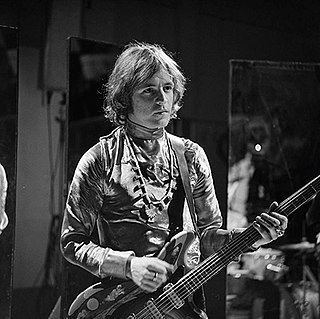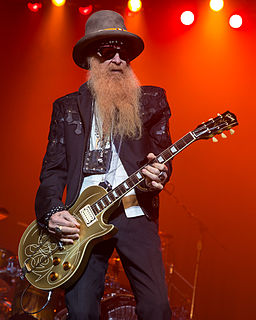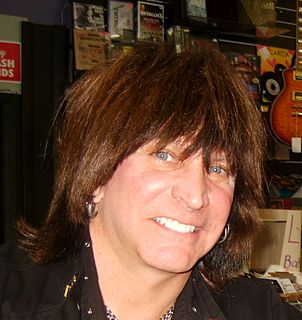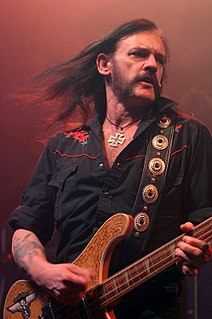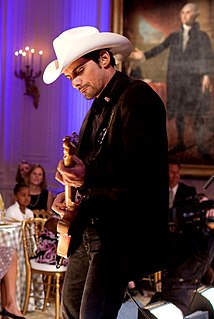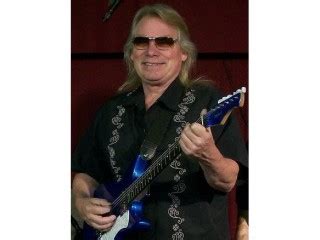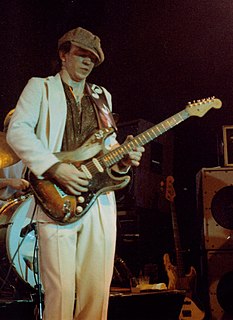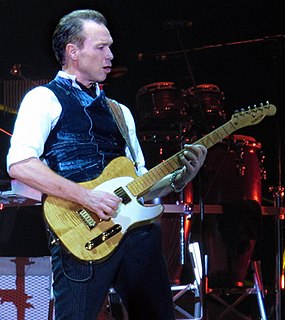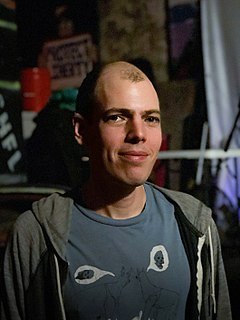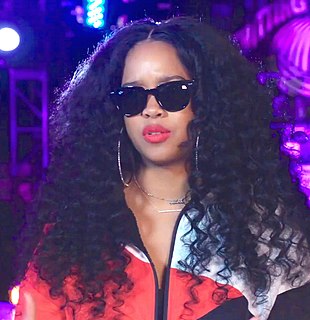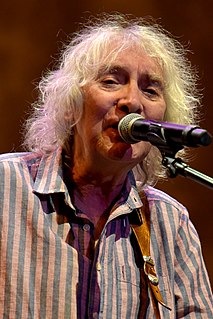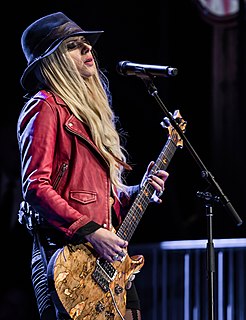Top 85 Clapton Quotes & Sayings - Page 2
Explore popular Clapton quotes.
Last updated on April 16, 2025.
On this side of the Atlantic, the arrival of a new Woody Allen movie is always greeted with tremors of bliss by filmgoers past the age of 60, with mild curiosity by those in their 50s, with trepidation by those in their 40s, with fear and loathing by those in their 30s, and with complete indifference by anyone younger. An icon to baby boomers, who will never concede that when something is over, it is really over (Clapton, McCartney, Santana, the 1960s), Allen has not made a truly memorable film since Bullets On Broadway back in 1994.
I’ve worked with such legendary guitar players as Allan Holdsworth, Ronnie Montrose, Eric Clapton, Lowell George and Steve Vai, but none of them come close to having Ed’s [Eddie Van Halen's] fantastic combination of chops and musicianship. I rank him along with Charlie Parker and Art Tatum as one of the three greatest musicians of my lifetime. Unfortunately, I don’t think Ed puts himself in that class.
For my 23rd birthday, I received a nylon string guitar. I told myself that if I could play Eric Clapton's 'Tears In Heaven,' then I could play the guitar. I practised every chance I got, driving my housemates insane, until several weeks later I had a shaky version of the song down. I wrote my first song on the guitar a few weeks after that.
Once we played at the Fillmore opposite The Cream. Eric Clapton was there and he played his ass off that night ... backstage Michael Bloomfield introduced me to Eric, and Eric was so nice. He came up to me, put his arms around me and said "Barry, it's such a pleasure to meet you" ... I couldn't figure it out... then Michael told me that he had told Eric I had cancer and two months to live...
I think people who basically do one thing like Eric Clapton is great. But I've always enjoyed playing different kinds of music and playing with different kinds of musicians because I find that really interesting, like learning and working with Kip Hanrahan. There's a great conga player called Milton Cardona and he taught me a lot of the nuances, he's a Santeria Priest and so he knows his onions as it were.
It seems like I always had to work harder than other people. Those nights when everybody else is asleep, and you sit in your room trying to play scales. I just wonder where I was when the talent was being given out, like George Benson, Kenny Burrell, Eric Clapton ... oh, there's many more! I wouldn't want to be like them, you understand, but I'd like to be equal, if you will.
I have a lot of analog. I think a lot of people do. There are a lot of people that are re-discovering it. I still have a lot of my old records from back in the day. It's a joy to play things like Junior Wells' 'Hoodoo Man Blues,' and John Mayall & The Blues Breakers with Eric Clapton. There's a warmth that you can still feel.
People used to say, "Clapton is God." That was a phrase that people attributed to him, and he was a guitar hero back in his day. He chose a different path. And you can read about it, but he was really at the top of his game back then. I think he's one of the greatest rock players who've ever lived. His timing and everything was just so on.
You've got to try to figure out which is the bigger benefit and which is the bigger loser. It nearly killed him [Eric Clapton ]; he was in a very, very bad way for a long time, but he came through it. Most people don't come through it because they don't have the money to buy the people to look after them.
I was lucky to have a guitar teacher who asked me what I wanted to learn. I brought in "High & Dry" by Radiohead and "Mr. Jones" by Counting Crows and he was like, "Alright, I'm gonna teach you these, but you're also gonna learn some stuff that I want you to learn." He taught me Jimi Hendrix and Eric Clapton, so I was getting the technical stuff and the fun stuff.
There are many excellent guitar players but I have to say Jimi Hendrix and Eric Clapton are still at the top! There are many imitators but very few genuine articles. There is so much more to playing than a fast blur of notes, like feeling and emotion from the soul. It's like punctuating a sentence and knowing when to lay back and not fill up all the space. Those are the things I tried to teach my son Tim when he began playing.
I kept listening, kept going to see people, kept sitting in with people, kept listening to records. If I wanted to learn somebody's stuff, like with Clapton, when I wanted to learn how he was getting some of his sounds - which were real neat - I learned how to make the sounds with my mouth and then copied that with my guitar.
Jazz stopped being creative in the early '80s. After your acoustic era, where you had the likes of the Miles Davis Quintet, when it gets to the '70s it started being jazz fusion where you had more electronic stuff happening, then in the '80s they started trying to bring back the acoustic stuff, like Branford Marsalis and the Wynton Marsalis & Eric Clapton sextet. It started dying down from there. Miles was still around in the '80s and he was still being creative; he was playing Michael Jackson songs and changing sounds, but a lot of people were still trying to regurgitate the old stuff.
I listened to all those blues records. They were great - Clapton, John Mayall. Then eventually I heard Genesis with Peter Gabriel, and I didn't really understand the difference then, but something struck me about the inversions and the diminished chords... they weren't as bluesy, and I loved it. I found out, that was very baroque-influenced.
I first met Jimmy Page in London in 1961, and he was listening to James Burton, Scotty Moore and Cliff Gallup with Gene Vincent, as was I ... these were the rock and roll guys who really sparked our interest in the guitar, and later we delved into other things and went different directions ... during my time with Eric Clapton, we talked about what we'd listened to early on, and he was a huge fan of Chuck Berry and Jerry Lee Lewis

